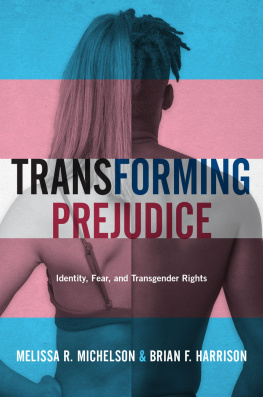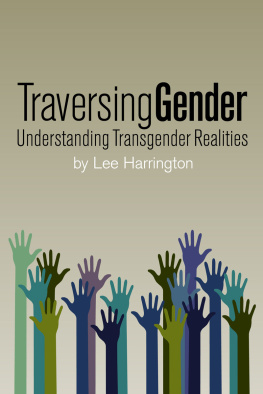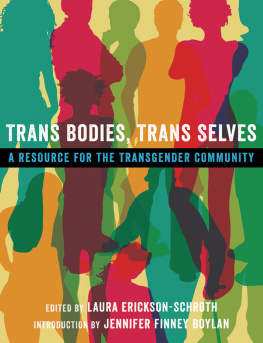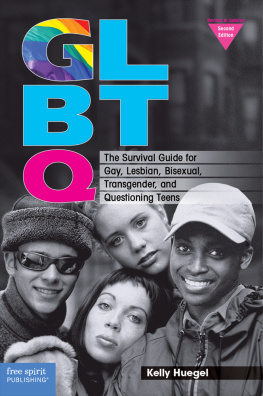Transforming Prejudice

Oxford University Press is a department of the University of Oxford. It furthers the Universitys objective of excellence in research, scholarship, and education by publishing worldwide. Oxford is a registered trade mark of Oxford University Press in the UK and certain other countries.
Published in the United States of America by Oxford University Press
198 Madison Avenue, New York, NY 10016, United States of America.
Oxford University Press 2020
All rights reserved. No part of this publication may be reproduced, stored in a retrieval system, or transmitted, in any form or by any means, without the prior permission in writing of Oxford University Press, or as expressly permitted by law, by license, or under terms agreed with the appropriate reproduction rights organization. Inquiries concerning reproduction outside the scope of the above should be sent to the Rights Department, Oxford University Press, at the address above.
You must not circulate this work in any other form and you must impose this same condition on any acquirer.
Library of Congress Cataloging-in-Publication Data
Names: Michelson, Melissa R., 1969 author. | Harrison, Brian F., author.
Title: Transforming prejudice : identity, fear, and transgender rights /
Michelson and Harrison.
Description: New York, NY : Oxford University Press, [2020] |
Includes bibliographical references and index.
Identifiers: LCCN 2019056233 (print) | LCCN 2019056234 (ebook) |
ISBN 9780190068882 (hardback) | ISBN 9780190068899 (paperback) |
ISBN 9780190068912 (epub)
Subjects: LCSH: Transgender peopleUnited StatesPublic opinion. |
TransphobiaUnited States. | Transgender peopleCivil rightsUnited States.
Classification: LCC HQ77.965.U6 M53 2020 (print) | LCC HQ77.965.U6 (ebook) |
DDC 306.76/80973dc23
LC record available at https://lccn.loc.gov/2019056233
LC ebook record available at https://lccn.loc.gov/2019056234
: We honor the strength it took to be yourselves. We dedicate our work to you in the hope that no more names will be added to this list.
Dana Martin
Ellie Marie Washtock
Jazzaline Ware
Johana Medina Leon
Ashanti Carmon
Claire Legato
Muhlaysia Booker
Michelle Tamika Washington
Paris Cameron
Chynal Lindsey
Johana Medina Leon
Chanel Scurlock
Zoe Spears
Brooklyn Lindsey
Denali Berries Stuckey
Tracy Single
Marquis Kiki Fantroy
Pebbles LaDime Doe
Bailey Reeves
Bee Love Slater
Elisha Chanel Stanley
Itali Marlowe
Brianna BB HillNikki KuhnhausenYahira Nesby
Contents
Tables
Figures
Permissions
1.3. From Jones, Philip Edward, and Paul R. Brewer. Elite Cues and Public Polarization on Transgender Rights. Politics, Groups, and Identities (2018). doi:10.1080/21565503.2018.1441722. Reprinted with permission of the publisher (Taylor & Francis Ltd, http://www.tandfonline.com).
2.4. Published with permission from Senator Jack Reed.
2.5. Published with permission from NBCUniversal Archives.
4.5. Published with permission from Logan Ireland.
5.1. From Plutchik, Robert. The Nature of Emotions: Human Emotions Have Deep Evolutionary Roots, a Fact That May Explain Their Complexity and Provide Tools for Clinical Practice. American Scientist 89, 4 (2001): 349, Figure 6. Reprinted with permission from American Scientist.
6.1. Photos of Brian and Melissa (photo credit for Brian: Pamela Einarsen Photography; photo credit for Melissa: Darcy Blake, Menlo College).
6.2. Published with permission from Kimberly Shappley.
6.3. Published with permission from Can Stock Photo Inc., grebeshkovmaxim.
The epigraph in is from A Litany for Survival. Copyright 1978 by Audre Lorde, from The Collected Poems of Audre Lorde by Audre Lorde. Republished with permission from W. W. Norton & Company, Inc.
Some details of the framing experiment described in were published in Harrison, Brian F., and Melissa R. Michelson, Using Experiments to Understand Public Attitudes Towards Transgender Rights. Politics, Groups, and Identities 5, 1 (2017): 152160.
Some details of the laboratory experiment described in were published in Harrison, Brian F., and Melissa R. Michelson, Gender, Masculinity Threat, and Support for Transgender Rights: An Experimental Study. Sex Roles 81, 1 (2019): 6375.
A team of amazing, hard-working students collected data for the Jack Reed experiment described in . Menlo College students Giselle Martinez Collado and Esther Funez expertly entered the data from those paper surveys into spreadsheets.
Much of the work in this book was shared with friends and colleagues along the way, and we appreciate their feedback and support. Logan Casey was originally a coauthor for the book project and played a huge role in designing and conducting the acknowledgment experiment described in . He also was crucial to our conversations early in the process about how changing minds about transgender people and rights differs from our earlier work on gay and lesbian rights, and what sort of strategies and messages might be effective at reducing reactance. Before the project was complete, Logan chose to separate from the project to focus on his important work at the Movement Advancement Project. We are grateful for his contributions and for his friendship.
We are also grateful to the LGBT politics colleagues who have shared feedback at conferences and in email conversations and whose work we build upon in our own. We are grateful to have such a supportive group of friends with whom we are working with as a subgroup in the discipline of political science to advance equality and justice for all LGBT people. This includes Jami Taylor, Ken Sherrill, Helma deVries-Jordan, Zein Murib, Andrew Flores, Barry Tadlock, Phil Jones, Pat Egan, Ellen Andersen, Jeremiah Garretson, Ben Bishin, Erin Mayo-Adam, Meg Osterbur, Shawn Schulenberg, R. G. Cravens, Gary Segura, Andrew Reynolds, Tony Smith, and Eric van der Vort. Other political science colleagues who are not part of the LGBT caucus but who also provided crucial support and feedback include Don Green, Alex Coppock, Marcela Garca-Castaon, and Jessica Lavariega Monforti.
The team at Oxford University Press was, as always, immensely encouraging and helpful. We are pretty sure that Angela Chnapko is the best book editor ever. Thanks also to the rest of the OUP team, especially Alexcee Bechthold.
We also thank the American Political Science Association, which provided funding for the acknowledgment experiment described in .
Melissa is grateful for the amazing support she receives from folks at Menlo College and for their financial support of her research. She is also grateful for the love and support of her family, including her parents, Linda Bernstein and Mei and Arthur Michelson, and also her husband, Christopher Gardner, and her children: Colin Gardner, Jackson Gardner, Joshua Michelson, and Zachary Michelson. The older boys are crucial for keeping her tuned in to recent cultural knowledge, such as the introduction of new transgender characters on Netflix shows, and the younger ones for keeping her from spending too much time staring at computer screens working when she could be playing with them. Christopher, of course, is crucial in ways that cannot fit on this page. Thanks, schmoopie, for everything. Brian would like to thank Joshua and Vivian for being patient with Daddy when he was working when theyd rather be playingand for asking good questions about what his book was about. I hope in the not-too-distant future, everyone will be as appreciative of how wonderful our differences are as these 7-year-olds are. And thank you to Shawn, as always, for your love and support. Love you.










